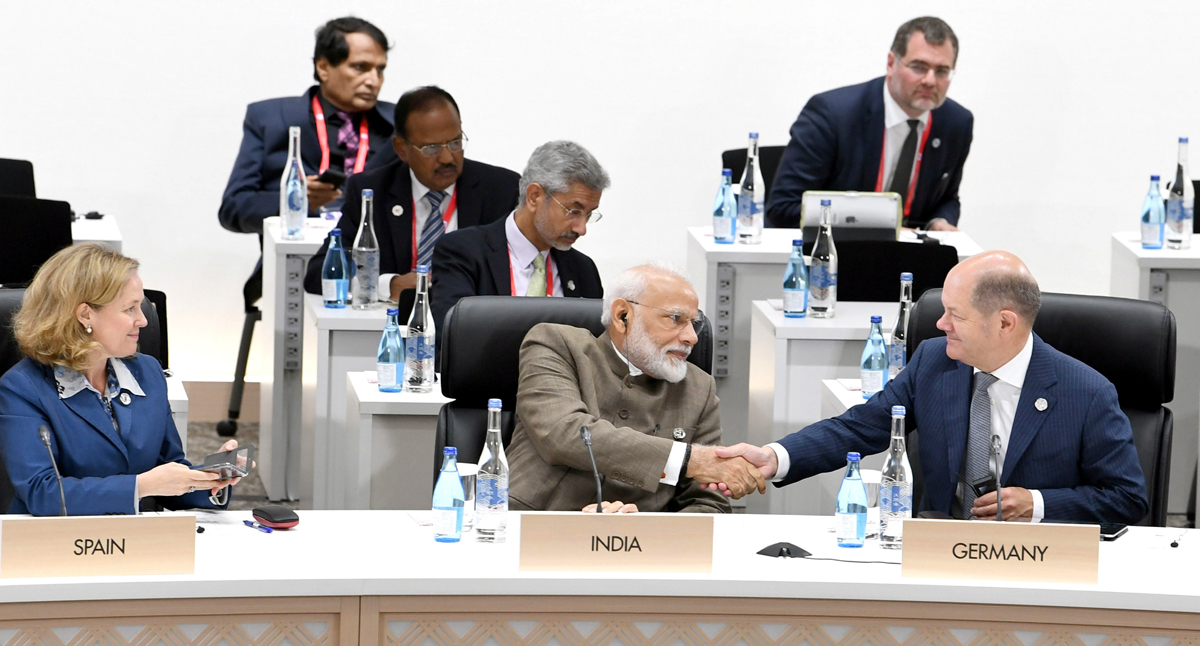
‘Committed to protect people from terrorism’
OSAKA, June 29: Prime Minister Narendra Modi and other leaders of the G20 today resolved to prevent the use of the internet to fund and facilitate terrorism and extremism, asserting that while the internet must be “open, free and secure”, it cannot serve as a safe haven for terrorists.
The leaders of the Group of 20 major economies in a statement after the Osaka summit said they are committed to act to protect people from terrorist and violent extremism conducive to terrorism (VECT) exploitation of the internet.
“As leaders, one of our greatest responsibilities is to ensure the security of our citizens. It is the State’s role, first and foremost, to prevent and combat terrorism. Here in Osaka, we reaffirm our commitment to act to protect our people from terrorist and VECT exploitation of the internet,” they said in a separate statement.
“We issue this statement to raise the bar of expectation for online platforms to do their part. We, the leaders of the G20, reaffirm our strongest condemnation of terrorism in all its forms and manifestations,” they said.
The G20 leaders said the live-streamed Christchurch terrorist attacks in New Zealand that killed 51 people, and other recent atrocities, demonstrate the urgency with “which we must fully implement relevant UN resolutions, the UN Global Counter Terrorism Strategy and other instruments, including the 2017 Hamburg G20 Leaders’ Statement on Countering Terrorism.”
The leaders, however, agreed that such efforts must respect human rights and “fundamental freedoms such as freedom of expression and access to information.”
They said the internet must not be a safe haven for terrorists to recruit, incite or prepare terrorist acts.
“To this end, we urge online platforms to adhere to the core principle, as affirmed in Hamburg, that the rule of law applies online as it does offline. This must be achieved in a way that is consistent with national and international law, including human rights and fundamental freedoms such as freedom of expression and access to information – we hold these in high regard. We commit to collaborate with States, international organisations, industry and civil society in this endeavour,” they said.
In the declaration issued after the summit, the leaders reaffirmed their commitment to applying the recently amended Financial Action Task Force (FATF) standards to virtual assets and related providers for anti-money laundering and countering the financing of terrorism.
They welcomed the UN Security Council Resolution 2462, which stresses the essential role of the FATF in setting global standards for preventing and combating money laundering, terrorist financing and proliferation financing.
“We reiterate our strong commitment to step up efforts to fight these threats, including by strengthening the FATF’s global network of regional bodies. We call for the full, effective and swift implementation of the FATF Standards,” the declaration said.
Meanwhile, Prime Minister Narendra Modi today held separate bilateral meetings with leaders of Indonesia, Brazil, Turkey, Australia, Singapore and Chile, and discussed a host of key issues including trade, counter-terrorism, defence, maritime security and sports.
Modi, who was in Osaka, Japan for the two-day G20 Summit, held his first official engagement on the last day of the summit with Indonesian President Joko Widodo.
The two leaders discussed ways to deepen bilateral cooperation in trade and investment, defence and maritime fronts.
“Beginning Day 2 of the #G20 Summit by meeting a valued friend. PM @narendramodi holds talks with President @jokowi on ways to deepen India-Indonesia cooperation,” the Prime Minister’s Office (PMO) tweeted.
In a tweet, Ministry of External Affairs spokesperson Raveesh Kumar said, “Taking forward the comprehensive strategic partnership. PM @narendramodi had a productive meeting with Indonesian President @jokowi on margins of #G20Summit. Discussed expanding cooperation in trade & investment, defence, maritime, space & exchanged views on Indo-Pacific vision”.
Soon after, Modi met Brazil President Jair Bolsonaro and held wide-ranging discussions on bilateral relationship, specially cooperation in trade and investment, agriculture and bio-fuels in the context of climate change.
“Deepening the close & multifaceted strategic partnership. PM @narendramodi & Brazilian President @jairbolsonaro held wide-ranging discussions on bilateral relationship, specially cooperation in trade & investment, agriculture & bio-fuels in the context of climate change,” Kumar tweeted.
He then met Turkish President Recep Tayyip Erdogan and held talks on a host of key issues including trade and investment, defence and counter-terrorism.
They talked about the strong development partnership between India and Turkey.
According to Kumar, the two leaders’ discussions focused on trade and investment, defence, counter-terrorism, IT and civil aviation.
“The interactions in Osaka continue. A productive meeting with President @RTErdogan on the sidelines of the #G20 Summit. Both leaders talked about the strong development partnership between India and Turkey,” the PMO said in a tweet.
In his meeting with Australian Prime Minister Scott Morrison, Prime Minister Modi had “good discussions on enhancing cooperation in sports, mining technology, defence and maritime cooperation and Indo-Pacific”.
The bonhomie between Morrison and Modi was on full display when the Australian Prime Minister tweeted a selfie with his Indian counterpart and praised him in Hindi “Kithana acha he Modi!”, a message which went viral.
Modi replied to his tweet by saying he was “stoked” about the energy of the India-Australia relations.
The Prime Minister then had pull-aside meetings with his Singaporean counterpart Lee Hsien Loong and Chilean President Sebastian Pinera and exchanged views on strengthening bilateral relations.
On Friday, Modi held bilateral and plurilateral meetings with many leaders, including US President Donald Trump, Russian president Vladimir Putin and China’s Xi Jinping.
Overall, Modi held nine bilateral meetings with the leaders of Japan, the US, Saudi Arabia, South Korea, Germany, Indonesia, Brazil, Turkey and Australia; eight pull-aside meetings with Thailand, Vietnam, the World Bank, the UNSG, France, Italy, Singapore and Chile; two plurilaterals — JAI (Japan-America-India) and RIC (Russia-India-China); one multilateral meeting of BRICS and four G20 sessions and a community event. (PTI)

